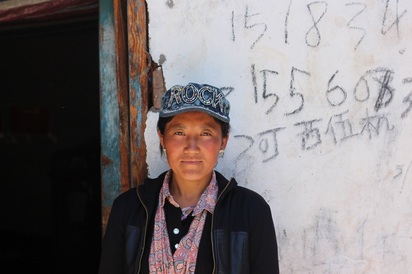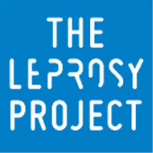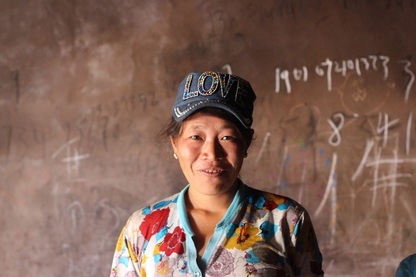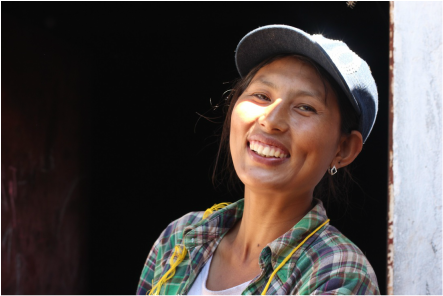 photo by Isobel Caldwell
photo by Isobel Caldwell Axi Wujiemo is 30 years old, and arrived in the village in Xide when she was 13, after her parents were diagnosed with leprosy. Before then, she was able to attend primary school, so can speak a little bit of Mandarin, but only enough to get by.
When she was 17 years old she got married and a year later had her first son. Today, she has five sons, the youngest being 2 years old and the oldest 10. Having so many young children to care for is hard because they are not old enough yet to help her or her husband with manual labor or to go out and work for themselves in the fields or factories. However she jokes that when they are older it will still be difficult, saying, “Having five sons is going to be very expensive when they are older! When each of them get married, the dowries are going to be around 12,000 to 15,000 RMB per wife, so it’s going to be so costly when they get to that age.”
In addition to having a large and young family, Axi Wujiemo must also care for her two elderly parents and her disabled half-brother. He has a severe limp and a sway to his walk causing him to require crutches. He lives with their parents in the building constructed for the elderly PALs and those in the village with restricted mobility. She is very grateful to the project for giving him medical advice and help. He receives medicine once a month, which has helped to relieve pressure on the family to provide medical assistance and payments.
Her husband works in the fields most days and helps out around the house when he can, but otherwise will go into the city and get casual jobs. Despite having that source of income, they still need to make more money to support themselves sufficiently.
Eight years ago, The Leprosy Project employed some teachers to come and instruct the women of the village on how to embroider Yi patterns and since then, Axi Wujiemo has been able to perfect some relatively simple patterns. In a month, she can make many individual pieces to sell and provide another source of income. Some of the more complicated patterns take a lot longer and require more skill as there is more detail. She says, “doing the embroidery is great because it’s a fairly simple source of income for me and my family, but sometimes when I am too busy, I don’t have as much time to complete pieces. This is why I normally stick to the simple patterns so I can produce more in less time.” There is not one particular pattern she enjoys sewing the most, she just sews what she likes or what she thinks other people will like.
She has many wishes for the future, those being for her parents to remain healthy, for her half brother’s condition to improve, and for her children to work hard and get good grades at school so they can lead independent and self-sustaining lives. For now, however, she knows there is only so much she can do, so has resolved to continuing her work with embroidery and upholding her responsibility to care for her children and her parents, believing that by helping to make a living, she can make sure her five boys can have a better life than what she had.
Interview and translation by Georgie Reading
Edited by Isobel Caldwell



 RSS Feed
RSS Feed
